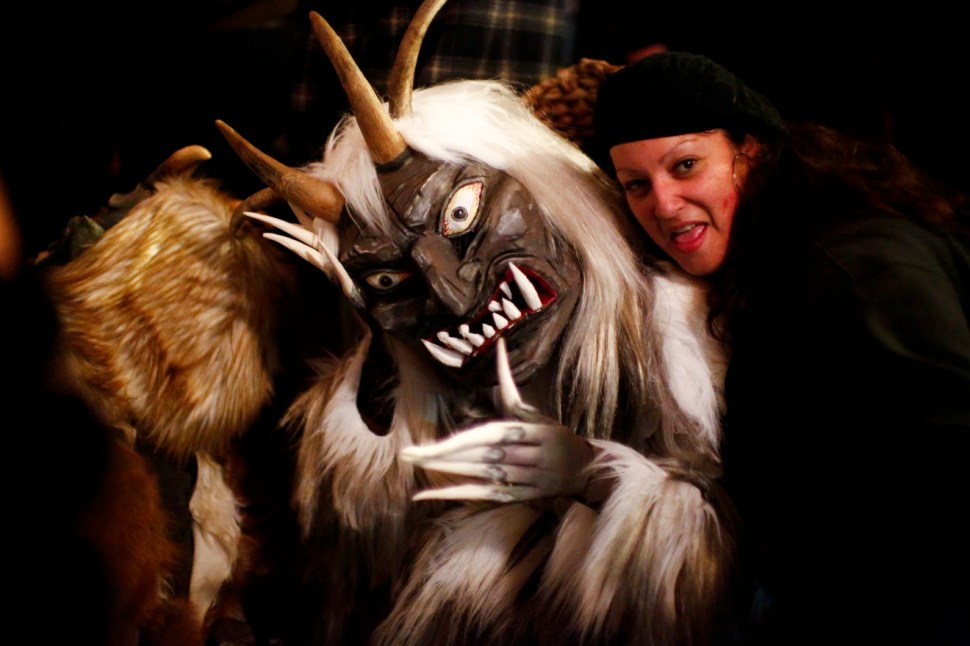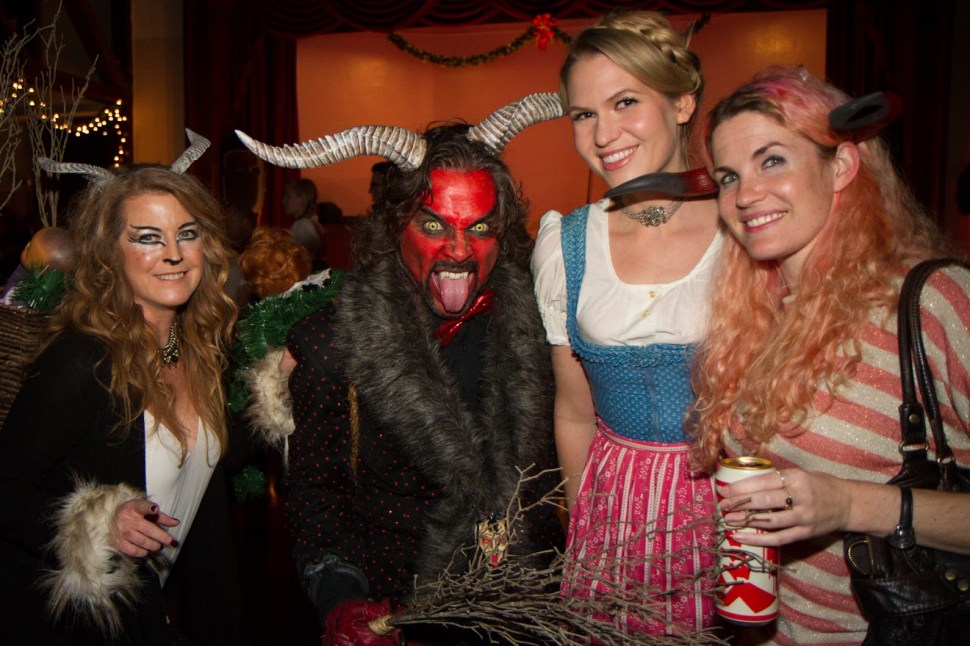We Boing Boing readers have rubbed elbows with the Krampus for some time now. We've maintained a proud familiarity with the Christmas devil and expect no less of our friends. We've bought the postcards, books, and the ugly Krampus Christmas sweaters. But for some of us, this would never be enough. For me and other Angelenos equally afflicted, the compulsion could only be vented in the obsessive construction of costumes and the unleashing, on the street of downtown LA, of a festive sprawling mass of bobbing horns, upraised switches, and clanking cowbells.
This is how Krampusfest began in my town in 2013. But it was not enough. It never is. By 2014, what we needed could only be found in the snowed-over mountain homeland of the beast. It had to get real. We needed Austrians!

Thankfully California's landscape of endless roads and desert is just the sort of thing to attract weary citizens of the old Habsburg Empire. In March of 2013, Martin Zehentner, director at a Salzburg web design firm and part-time Krampus, and his sister Astrid, had planned a driving tour of the Western United States. His itinerary happened to include Los Angeles. Having made acquaintance online, LA troupe members were eager to soak in whatever wisdom he might offer as to how things were properly done in the Krampus Fatherland.
 Over chips and tequila at Hollywood's kitschy landmark El Coyote, Zehentner was encouraged to return in costume and experience LA's Krampusfest in 2014, a request he's accepting this December as he, his sister, and nephew Cristoph, become the first costumed European Krampuses to strut their demonic stuff on these shores.
Over chips and tequila at Hollywood's kitschy landmark El Coyote, Zehentner was encouraged to return in costume and experience LA's Krampusfest in 2014, a request he's accepting this December as he, his sister, and nephew Cristoph, become the first costumed European Krampuses to strut their demonic stuff on these shores.

From the beginning, LA's Krampusfest has been tied with the area around Salzburg. My involvement began on Dec. 5—Krampusnacht—in 2012, during a visit to the scenic mountain town of Badgastein about an hour and a half south of Zehentner's home. Compelled to experience firsthand the well-preserved Krampus traditions Badgastein is known for, I had just returned that night from my first evening of rough-and-tumble with the devils, when I received an email from Al Guerrero, a co-conspirator from the Cacophony Society. The snow was still melting on my coat, as I read his message detailing plans for the inaugural LA Krampus run in 2013. Neither of us had ever spoken of this, but as disillusioned graduates of Santacon bereft of an outlet for costumed holiday street theater, the progression was a natural.

After 2013's hustle of costume fabrication, we were ready for our run, and a costume ball, for which we enticed fellow Cacophonist and Green Jellÿ alum Greg Reynard's into creating the group's house band: Krammpstein (a painstaking re-imaging of the German industrial-metal band Rammstein in Krampus drag). Reynard's band will return for the 2014 Krampus Ball on December 6 along with 2013 Ball favorites G.T.E.V D'Oberlandler, a local Bavarian culture group demonstrating folkloric Schuhplattler dances and performing musical numbers on tuned cowbells and the mighty alphorn. Also featured in the 2014 ball will be a devilish holiday puppet show, German cabaret, and of course, an "attack" by our indigenous Krampuses now fortified with Austrian shock-troops.

Zehentner is a member of one of Salzburg area's oldest troupes, the Alt Gnigler. Mindful of traditionalist concerns, Zehentner says that with first online contact, he had misgiving about any transatlantic endeavors, wondering if Americans would "really understand our traditions—or will the Krampus be reduced to a Halloween horror figure?" Most Austrians, he says, are generally unaware of America's love affair with the Krampus, or if they are, might expect it to result in something closer to "slasher movies than anything genuinely linked to our customs." When he mentioned our efforts to bring the tradition to the US, most in Alt Gnigler regarded it as "madness—but in a positive way."
"At first," he says, "they were skeptical. But, later, fascinated." Realistically, he says his fellow troupe members don't expect the California group to mirror the look and feel of Alt Gnigler. Noting how our American-made masks deviate from the Alt Gnigler norm, Zehentner concedes, "This is absolutely okay. There are regional influences and differences in Austria too."
Another Austrian acquaintance of Krampus LA is Matthäus Rest, a cultural anthropologist and native of the Gastein valley, who's done fieldwork on the tradition. Like Zehenter, he's willing to takes a broader view on American imitations, observing, "The customs in Central Europe are so multifaceted that I don't think an American event will per se be different from a European one."
But Rest foresees some of the same nativist skepticism Zehentner observes. "Many will be amused by it," Rest says, "maybe feel proud about the diffusion of Alpine folklore, but some traditionalists will not be happy about it and lament the 'inauthenticity' as it feeds into their narrative of 'commercialization,' which can be seen all over Austria and Germany."

Despite occasional indiscretions, like presenting a Krampusfied Rammstein parody band, Guerrero and I have attempted to be cautious about anchoring our events in authentic tradition and have even sought through a variety of past presentations to educate the public about the genuine article. Toward that end, we're honored to be offering a presentation on Krampus folklore at the Goethe Institut of Los Angeles on November 29 (and hoping that Germany's expat elite often attending these events will smile on our friendly cultural appropriation and colorful presentation — with costumes, yet!).
We'll also be presenting excerpts from an authentic 19th-century Alpine Nicholas/Krampus play in a lovely Gothic Revival church in Pasadena on December 13. Somewhat similar to England's Christmas mummers plays, these theatrical outings are considered to be one of the origins of the Krampus traditions and were just listed last year by UNESCO as be part of Austria's "intangible cultural heritage." To my knowledge, none of these plays have been presented outside of their homeland, and certainly not in this country as our English translation is one I crafted myself.
The play will be paired with the US debut of 1955 film version of the frightful "children's" book, "Der Struwwelpeter." Kindly loaned by Berlin's Genschow Media Production, the film will be presented for this single occasion with original English subtitles also created specifically for Krampusfest. Der Struwwelpeter (known as Shockhead Peter to fans of the Tiger Lillies 1990s album and stage production) depicts the grisly fates of misbehaving children, and shares with the Krampus tradition a similarly un-PC and punitive attitude toward child-rearing, nicknamed by the Germans "sugar-bread and whip."

The remaining event for the festival will be our part in a holiday parade in LA's Echo Park neighborhood earlier on the day of the play. We'll not only be joined by the our friends from Salzburg but also by Kimric Smythe, an Oakland accordion shop, fellow Cacophonist and SRL alum. He's built a lovely steam-driven car from an old horse-cart in which he'll transport St. Nicholas and a Krampus or two. Given his experience working for a costume company, Smythe was quick to join the fun when he saw the costumes being generated in LA, but he's one-upped us by forging his own enormous European-style cowbells, an iconic accouterment worn with all proper Krampus suits. He's also formed his own group, Beast Bay Krampus holding their own inaugural events December 6 and 7 up north.

The camaraderie of hosting visits and performance by members of out-of-town troupes has become part of the Krampus tradition in Europe and is one we're eagerly embracing, hoping to bring in more members from elsewhere in the US and overseas for our 2016 events. Zehentner also thinks along those lines. "We hope that our visit and the constant dialogue will help establishing the tradition in the US," he says. "This could be a good base for future participation both there and in Europe. We really want to see our American friends in Salzburg, so they can feel the spirit of the tradition in its homeland."
Sounds good to me.






